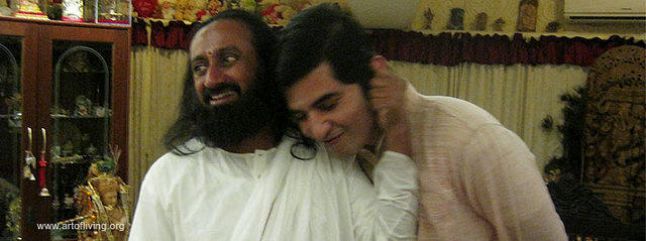It was only after his parents stopped calling him Junior Durvasa (the Indian saint famous for his temper and the equally harsh curses), that Harish Ramachandran, CEO of Sumeru Software Solutions realized that he had not lost his temper in a while.
“My parents thought I was finally growing up,” he says. That’s when he realized that it was the effect of the Sudarshan Kriya.
“I was studying computer science in IIT Bombay at that time. One of my friends, Khurshed Batliwala, (aka Bawa) who lived two rooms away, told me that it was a nice course and refused to tell me anything more. I said yes because he was a close friend, but I had no intention of going.”
Somehow Harish did go for the course and found himself impressed by the teacher Rajshree Patel.
“I was amazed by her dynamism and by the Sudarshan Kriya. The experience of the Kriya was an eye-opener.”
Harish Ramachandran then found that suddenly life had opened up many doors for him.
“I realized that my anger had dropped, but the intensity stayed. And so I had a lot more energy. I began involving myself in many activities in the college. I became a cultural secretary. It was not something I would ordinarily have done. My shyness also dropped and I started mixing more freely with people and my organizing capabilities also expanded.”
So he, along with his friends helped Khurshed, who had become a teacher by then, organize courses.
“When I think about it now, I realize that we had no motive. We simply enjoyed doing it.”
Later that year, Harish also met His Holiness Gurudev Sri Sri Ravi Shankar for the first time at a satsang.
“I liked the Kriya and I was practicing regularly, but I was not sure about meeting Gurudev. Looking back I see that I became passionate about the organization only after meeting him,” he recalls.
“I felt a powerful attraction, but I was shy to approach him. I felt like a little child. But there was this deep sense of silence and stillness.”
Harish then became a teacher in 1996, after graduating from college.
“Initially I was working and teaching. Then I moved to Chennai and became a full time teacher, travelling across Tamil Nadu and Europe.”
In 2001, Gurudev called him to the Bangalore ashram.
“That’s when I got to know about Sumeru Software and I was pulled into it. But I had a strong aversion for IT and I guess I could overcome it only because I realized that the company’s objective was to support The Art of Living service initiatives through its profits. I thought it was a good way to contribute.”
Harish was also initially reluctant because he wanted to teach The Art of living courses full-time and setting up a company meant that he could not spend as much time in teaching courses as he would have liked. Nevertheless, Harish was sure of one thing, he wanted to be with Gurudev, in whatever way possible.
“We were celebrating Aban Aunty’s birthday in the Sumeru Mantap. Gurudev cut a cake with her and then he started walking around the Mantap. I started to follow him when someone offered me cake. Not wanting to stop, I said, ’I choose the Master’, and jumped ahead. Gurudev, who was a few steps ahead, called me to him and said with a smile,” I thought the Master chose you!” That moment, I felt utterly grateful to be chosen by him.”
“I remember, on my first advanced course with him in December 1993, somebody asked Gurudev to think carefully and answer his question. Gurudev said ‘I don’t think before I speak. What I speak is what the space wants me to say at that time.’ This has remained with me ever since. There are so many times that I have heard him say something out of the blue. And whatever he would have said at that time would be the most appropriate.”
In yet another advanced course, Gurudev once shared that ‘This body, every cell of my body, is here for you’.
“This statement had a profound impact on me. I felt that nothing can be more selfless. All the small worries and desires become insignificant in the face of a chance to be with somebody who can say something like this. I thought there has to be some contribution from my side. It spurred me to think of becoming a teacher.”
Once, Harish was working on a book ‘Heritage of the Dalits’ for which Gurudev wrote the introductory note. The book was supposed to be presented at a conference in South Africa.
“Gurudev’s point of view was that the caste system was not a product of Indian philosophy or body of thought. In the book Gurudev points out that there were many Indian saints who belonged to the so-called lower classes. Krishna was a cowherd, Valmiki was a hunter turned saint, Veda Vyasa was a fisherwoman’s son. Many other saints like Kabir and Ravi Das all belonged to the so-called lower castes,” explains Harish.
“Gurudev dictated his introductory note in installments. He would dictate one part and he would go off to meet the people who were waiting to see him or attend to something and so on... But when we finished, I realized that there was not one word we needed to edit. The thread was complete.”
According to Harish, spirituality is integrated into all aspects of life and permeates everything that one does.
“It is not a separate concept; it is a part of life.Spiritual practices help remove the stresses that takes one away from one’s nature.”
And Harish only has one goal in his life.“I just want to be with Gurudev and help contribute to society in any way that I can”
If you like the story please write to us at webteam.india@artofliving.org
Writer: Harshini Vakkalanka, Graphics: Gurudatt Anveker




